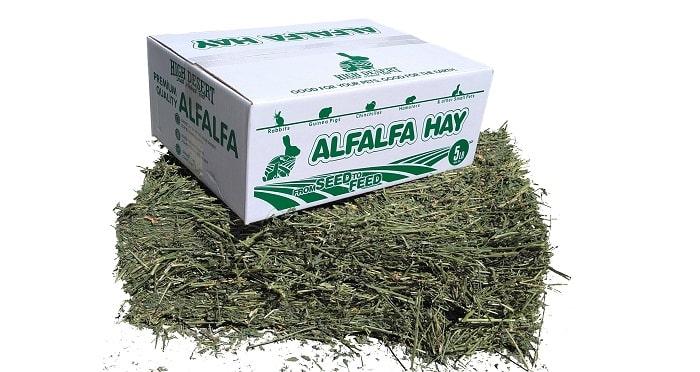Alfalfa is a good source of protein and calories. It is often used in the diets of young or convalescing animals that require higher levels of nutrition.
It is also a good choice for milking goats or in late pregnancy because it contains more protein and calcium. However, it should not be fed to mature adult goats because excess protein consumption can cause bloat.
It’s a good source of protein
Quality alfalfa hay is rich in protein and calories, making it an excellent source of energy. However, it is important to note that alfalfa hay’s energy can be too much for some horses. This is especially true for horses with Equine Metabolic Syndrome (insulin resistance). Excessive energy can lead to laminitis and other health problems in these horses.
In addition to its high protein content, alfalfa hay is also a good source of vitamins and minerals. It contains high concentrations of calcium and magnesium and may contain varying amounts of phosphorus depending on the location in which it was grown. Alfalfa hay also contains a large number of trace minerals, including copper, chromium, iron, manganese, selenium, potassium, and zinc.
The high nutrient content of alfalfa makes it a suitable food for horses in the reproductive stages, such as lactating mares and broodmares, which require extra energy to produce milk. It is also a good choice for working horses, as it provides an energy boost and helps them maintain their condition.
Alfalfa is also an excellent choice for young, growing horses as it contains protein and calcium. In addition, it contains phosphorus, vital for a healthy skeleton’s growth. Nevertheless, a balanced diet must be fed to growing horses since alfalfa hay’s calcium to phosphorus ratio is often only 1.5-2 parts of calcium to 1 part of phosphorus.
Alfalfa hay is available in a variety of bale sizes, ranging from small two-string (or three-string) bales to half-ton square bales. The smallest bales are called flakes and are easy to hand separate into individual pieces for feeding. These smaller-sized bales are also commonly used for small animals, such as rabbits, guinea pigs, and chinchillas. The flakes are an excellent alternative to Timothy hay for small pets with allergies. However, you should be careful about purchasing hay from sources that have not been carefully inspected. This is particularly important in the west and south of the United States, where blister beetles are known to be present.
It’s a good source of calories
Alfalfa hay is rich in energy and protein. It also contains fewer nonstructural carbohydrates than grass hays, making it easier for horses to digest. It can be a good source of calories for hardworking horses that require extra energy. However, too much alfalfa can cause diarrhea in horses. It is best to feed it gradually, and it is recommended that it be fed alongside other types of hay.
Alfalfa is often grown in the Western and Rocky Mountain states and is most nutritious when harvested before blooming. It has a high moisture content, so it is usually baled into small bales that are referred to as two-string or four-string bales. The smallest bales are known as “flakes.” The bales should be carefully examined for signs of insect infestation and disease. Blister beetles are a particular problem in alfalfa and other legumes in the Central United States. Those that are infected should be rejected, as the beetles can carry harmful bacteria.
The high protein content of alfalfa makes it an excellent choice for foals, as it is essential during the growth and development stage. While some people believe that excessive protein can cause problems for young foals, this is untrue. Foals need dietary crude protein for healthy bone metabolism and other functions.
One of the main reasons why alfalfa hay is a good source of protein is because it has many beneficial microbes. These microbes help break down the protein in the horse’s digestive tract, which helps the horse absorb it more easily. Additionally, these microbes can help reduce the risk of stomach ulcers by reducing the stomach’s acid.
Another reason why alfalfa hay is an excellent protein source is because it has a very high density of phosphorous and calcium. This allows it to help meet the needs of mature horses that require a higher calcium-to-phosphorous ratio than grass hays can provide.
It’s a good source of calcium
Alfalfa is rich in calcium, and it can provide a significant amount of nutrients for your small pet’s diet. Its high protein content can also provide extra energy to help the pet grow and develop. However, too much alfalfa can strain your small pet’s kidneys, so you should limit their food intake.
Alfalfa hay is more nutritious than grass hay and contains more crude protein, phosphorus, and calcium. It also has fewer nonstructural carbohydrates, which are sugars and starches. This makes it a great feed for underweight horses, as it helps them gain weight. It is also an excellent source of nutrients for pregnant and lactating mares. These mares have elevated protein and amino acid lysine requirements, and alfalfa provides these requirements.
Another benefit of alfalfa is its high potassium content, which is helpful for horses that have a genetic muscle disease called hyperkalemic periodic paralysis. This condition causes a buildup of potassium in the blood, which can cause muscle spasms and paralysis. Unlike grass hay, which has an extremely high potassium content, alfalfa hay has moderate levels of minerals.
In addition to being a good source of protein and calcium, alfalfa has many other health benefits. It is an excellent source of vitamins A and K, folate, and minerals like copper and zinc. It is also an excellent source of fatty acids, which can help reduce the risk of heart disease.
The high-quality protein in alfalfa hay can help the hoof of a horse that has suffered from laminitis repair itself. The plant also has a higher level of calories than most grass hay, which can give the horse enough energy to support its recovery process.
The hay should be of good quality and come from a trusted supplier. It should be grown without pesticides and free of mold and other contaminants. It should also be free of blister beetles, which can be toxic if eaten in large amounts. The beetles are attracted to the alfalfa flowers, and if they are not removed from the fields before harvesting, they can leave behind the toxin cantharidin in the hay.
It’s a good source of vitamins
Alfalfa hay is nutrient-rich and has high protein, calcium, vitamin, and mineral concentrations. Its roots also reach much farther into the ground than grass hay plants, which allows them to absorb more nutrients from the soil. Alfalfa hay is also a good source of fiber, which is important for digestion and overall health in horses, cows, and other livestock.
Alfalfa is a legume; therefore, it has the unique ability to fix nitrogen in its root nodules. This allows it to produce high levels of plant protein even in the absence of nitrogen in the soil. In addition, alfalfa is rich in other essential vitamins and minerals like potassium, phosphorus, sulfur, molybdenum, and zinc.
The best quality alfalfa is harvested in the spring before it blooms. Jamback Farms is very careful and conscientious when selecting our alfalfa to ensure that it’s not contaminated with blister beetles, which can be dangerous for horses. It’s also important to pick alfalfa hay that has not been damaged or spoiled by rain.
When fed as part of a balanced diet, alfalfa can provide the energy and protein that is needed by working or breeding horses. It is particularly useful for pregnant or lactating mares because it can help meet their elevated protein and lysine requirements. However, a diet that is exclusively alfalfa can be lacking in trace minerals, particularly copper and zinc. It is recommended that a ration balancer or commercial feed be used to provide these important nutrients.
Although alfalfa is a valuable ingredient for horse feeding, it’s not suitable for all horses. It’s not recommended for young, fast-growing horses or those with liver or kidney problems. In addition, alfalfa can cause colic in horses. For these reasons, it’s important to understand the benefits and limitations of this hay before incorporating it into your horse’s diet. Your veterinarian, nutritionist, or feed manufacturer can advise you on creating a balanced diet that includes alfalfa hay.


